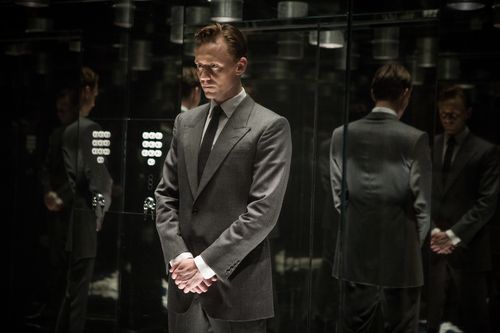
Studiocanal
MOVIE REVIEW
High-Rise (2016)
J. G. Ballard’s 1975 novel “High-Rise” famously cold-opens with a hot sentence about a dead dog; Ben Wheatley and Amy Jump‘s film adaptation opts to cut directly from the urbane sophisticate Robert Laing (Tom Hiddleston) glancing at the animal to the spit-roasting aftermath. The elision makes for a decent cinematic effect, showing not telling; but also sounds a warning shot about conventionality, a distilling down of Ballard’s haunted prose into nothing more adventurous than good old black humor. Mr. Wheatley’s taste for unsympathetic British grotesques also starts to crop up early before running rampant across the narrative by the end, joining a handful of Ballard’s dots about the inhabitants of the island without getting much of a grip on his social science.
David Cronenberg‘s film of “Crash” spotted that the key to capturing Ballard’s chill is to keep a cool head yourself, a trick Mr. Wheatley only manages for about half an hour. As per the book’s plan, Mr. Hiddleston’s doctor moves into a brutalist apartment building fully equipped with swimming pool, shops and all mid-’70s mod cons. At the top of the block perches its architect Royal (Jeremy Irons), orbited by sycophantic toffs, toughs and thugs — one blessed with the perfectly Home Counties name of Pangbourne and played by James Purefoy, two shorthands for the price of one. Toward the bottom live the proles, in particular cameraman Wilder (Luke Evans) and his wife, Helen (Elisabeth Moss). Laing manages to balance in the middle, despite Mr. Hiddleston’s cultured poise inevitably suggesting that he’s looking upward rather than down. Helen reports that Laing’s tenancy application was “very Byronic,” an added line that certainly chimes with Mr. Hiddleston’s profile.
Social order duly breaks down into a more fulfilling mayhem — although the filmmakers ultimately opt for the wrong explanation as to why — and does so in a hurry. The novel has the luxury of allotting more or less equal space to Wilder’s brewing paternal dissatisfactions and to Laing’s sexual indulgences with the block’s multiple married women; but the film has to get on with things, so characters seem constantly to be caught in mid-overreaction, leaving the audience behind. Dreamy montages stand in for plot advancement, feeling like simple time-saving shorthand rather than evocative of the viscous dread of Nic Roeg whom Mr. Wheatley rightly admires.
The script also decides to give Laing a dead sister, the kind of motivational familial anguish which has lost almost all its sting through overuse in the cinema and which Ballard avoided by having her be still breathing and living downstairs. Truthfully many of the script’s other additions also sound a bit cloth-eared. Sienna Guillory, skilfully playing a terrible TV actress, announces the depravity and ennui of the media classes by entering an overdecadent party and shouting the standard gangbang invitation for all-comers to approach from the rear — a thankless task which leaves any claim to incisive satire hanging flaccid from then on.
Satire and grotesquerie can live together in the same pot; but it needs an expert chef. As in “Sightseers,” Mr. Wheatley’s Achilles’ heel is a disinterest in fleshing out the humanity of his characters beyond a level needed to support a sardonic laugh. Clint Mansell‘s string-heavy score fills in some of the compassion — and once or twice nods toward Howard Shore, for added Cronenbergian unease — although the soundtrack also climaxes with Portishead‘s doomy, plaintive, minor-key cover version of an upbeat pop song and intends it to be a cutting chill, which might suggest that no one involved has spotted video-game adverts driving this tactic into the ground too.
As Laing moves ineffectually to the sidelines, Wilder comes to the fore, making Mr. Evans the film’s standout memory. Thickset and pugnacious just as Ballard described — but with added Welshness that arrived with the actor — Mr. Evans’s unreconstructed macho presence beams in direct from the 1970s rule book of prescribed male behavior and a decade’s worth of aftershave commercials, not to mention the 1970s heyday of Oliver Reed. The novel is at least as interested in sexual politics as class; but of the males on screen only Wilder acts as if his gender causes him both pleasure and grief. The rest of the film is happy just to pitch haves against have-nots, men against women — a surface-level bit of social analysis that duly climaxes by invoking no less a demon mother than Margaret Thatcher. Ballard’s interest in the profound frictions of cohabitation divined more ambiguous urban hierarchies in there than just class, and he peered at them without indulging in contempt for anyone unlucky enough to lack self-awareness of their concrete cells — something even the makers of a Ballard-adjacent pastiche such as “Dredd” sensed with rather more success than materializes here.
Comments